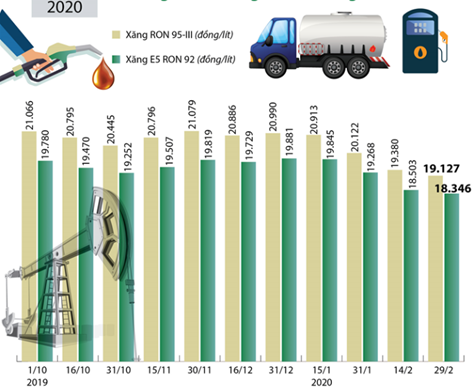Cho phương trình \({\log _7}\left( {{x^2} + 2x + 2} \right) + 1 > {\log _7}\left( {{x^2} + 6x + 5 + m} \right)\). Có tất cả bao nhiêu giá trị nguyên của tham số m để bất phương trình trên có tập nghiệm chứa khoảng \(\left( {1;3} \right)\)?
Trả lời bởi giáo viên
ĐK: \({x^2} + 6x + 5 + m > 0.\)
\(\begin{array}{l}{\log _7}\left( {{x^2} + 2x + 2} \right) + 1 > {\log _7}\left( {{x^2} + 6x + 5 + m} \right)\\ \Leftrightarrow {\log _7}7\left( {{x^2} + 2x + 2} \right) > {\log _7}\left( {{x^2} + 6x + 5 + m} \right)\\ \Leftrightarrow 7\left( {{x^2} + 2x + 2} \right) > {x^2} + 6x + 5 + m\\ \Leftrightarrow 7{x^2} + 14x + 14 - {x^2} - 6x - 5 - m > 0\\ \Leftrightarrow 6{x^2} + 8x + 9 - m > 0\end{array}\)
Bất phương trình đã cho có tập nghiệm chứa \(\left( {1;3} \right)\)
\(\begin{array}{l} \Leftrightarrow \left\{ \begin{array}{l}{x^2} + 6x + 5 + m > 0,\forall x \in \left( {1;3} \right)\\6{x^2} + 8x + 9 - m > 0,\forall x \in \left( {1;3} \right)\end{array} \right.\\ \Leftrightarrow \left\{ \begin{array}{l}m > - {x^2} - 6x - 5,\forall x \in \left( {1;3} \right)\\m < 6{x^2} + 8x + 9,\forall x \in \left( {1;3} \right)\end{array} \right.\,\,\left( * \right)\end{array}\)
\( \Leftrightarrow \left\{ \begin{array}{l}m \ge \mathop {\max }\limits_{\left[ {1;3} \right]} f\left( x \right)\\m \le \mathop {\min }\limits_{\left[ {1;3} \right]} g\left( x \right)\end{array} \right.\)
với \(f\left( x \right) = - {x^2} - 6x - 5\) và \(g\left( x \right) = 6{x^2} + 8x + 9\)
Ta có:
\(f'\left( x \right) = - 2x - 6 = 0\) \( \Leftrightarrow x = - 3 \notin \left( {1;3} \right)\) và \(f'\left( x \right) < 0,\forall x \in \left( {1;3} \right)\) nên hàm số \(y = f\left( x \right)\) nghịch biến trên \(\left( {1;3} \right)\)
\( \Rightarrow \mathop {\max }\limits_{\left[ {1;3} \right]} f\left( x \right) = f\left( 1 \right) = - 12\) \( \Rightarrow m \ge - 12\)
\(g'\left( x \right) = 12x + 8 = 0\) \( \Leftrightarrow x = - \frac{2}{3} \notin \left( {1;3} \right)\) và \(g'\left( x \right) > 0,\forall x \in \left( {1;3} \right)\) nên hàm số \(y = g\left( x \right)\) đồng biến trên \(\left( {1;3} \right)\)
\( \Rightarrow \mathop {\min }\limits_{\left[ {1;3} \right]} g\left( x \right) = g\left( 1 \right) = 23\) \( \Rightarrow m \le 23\)
Vậy \( - 12 \le m \le 23\).
Mà \(m \in \mathbb{Z} \Rightarrow m \in \left\{ { - 12; - 11;...;23} \right\}\) hay có \(23 - \left( { - 12} \right) + 1 = 36\) giá trị.
Giải thích thêm:
Cách khác:
Bất phương trình đã cho có nghiệm chứa khoảng \(\left( {1;\,\,3} \right)\) \( \Leftrightarrow \) bất phương trình đã cho xác định trên khoảng \(\left( {1;\,\,3} \right)\) và bất phương trình luôn đúng với mọi \(x \in \mathbb{R}\) hoặc bất phương trình có nghiệm thỏa mãn \(\left[ \begin{array}{l}3 \le {x_1} < {x_2}\\{x_1} < {x_2} \le 1\end{array} \right.\) với \({x_1},\,\,{x_2}\) là hai nghiệm của phương trình \(6{x^2} + 8x + 9 - m = 0.\)
\(\begin{array}{l} \Leftrightarrow \left[ \begin{array}{l}\Delta ' < 0\\\left\{ \begin{array}{l}\Delta ' \ge 0\\\left[ \begin{array}{l}\left\{ \begin{array}{l}{x_1} + {x_2} > 6\\\left( {{x_1} - 3} \right)\left( {{x_2} - 3} \right) \ge 0\end{array} \right.\\\left\{ \begin{array}{l}{x_1} + {x_2} < 2\\\left( {{x_1} - 1} \right)\left( {x{ _2} - 1} \right) \ge 0\end{array} \right.\end{array} \right.\end{array} \right.\end{array} \right. \Leftrightarrow \left[ \begin{array}{l}{4^2} - 6\left( {9 - m} \right) < 0\\\left\{ \begin{array}{l}{4^2} - 6\left( {9 - m} \right) \ge 0\\\left[ \begin{array}{l}\left\{ \begin{array}{l} - \dfrac{8}{6} > 6\,\,\,\left( {ktm} \right)\\{x_1}{x_2} - 3\left( {{x_1} + {x_2}} \right) + 9 \ge 0\end{array} \right.\\\left\{ \begin{array}{l} - \dfrac{8}{6} < 2\\{x_1}{x_2} - \left( {{x_1} + {x_2}} \right) + 1 \ge 0\end{array} \right.\end{array} \right.\end{array} \right.\end{array} \right.\\ \Leftrightarrow \left[ \begin{array}{l}16 - 54 + 6m < 0\\\left\{ \begin{array}{l}16 - 54 + 6m \ge 0\\\dfrac{{9 - m}}{6} + \dfrac{8}{6} + 1 \ge 0\end{array} \right.\end{array} \right. \Leftrightarrow \left[ \begin{array}{l}m < \dfrac{{19}}{3}\\\left\{ \begin{array}{l}m \ge \dfrac{{19}}{3}\\9 - m + 8 + 6 \ge 0\end{array} \right.\end{array} \right. \Leftrightarrow \left[ \begin{array}{l}m < \dfrac{{19}}{3}\\\left\{ \begin{array}{l}m \ge \dfrac{{19}}{3}\\m \le 23\end{array} \right.\end{array} \right. \Leftrightarrow \left[ \begin{array}{l}m < \dfrac{{19}}{3}\\\dfrac{{19}}{3} \le m \le 23\end{array} \right. \Leftrightarrow m \le 23\end{array}\)
Hàm số đã cho xác định trên \(\left( {1;\,\,3} \right)\)\( \Leftrightarrow \)\({x^2} + 6x + 5 + m > 0\,\,\forall x \in \left( {1;\,3} \right)\)
\(\begin{array}{l} \Leftrightarrow \left[ \begin{array}{l}\Delta ' < 0\\\left\{ \begin{array}{l}\Delta ' \ge 0\\\left[ \begin{array}{l}3 \le {x_1} < {x_2}\\{x_1} < {x_2} \le 1\end{array} \right.\end{array} \right.\end{array} \right. \Leftrightarrow \left[ \begin{array}{l}\Delta ' < 0\\\left\{ \begin{array}{l}\Delta ' \ge 0\\\left[ \begin{array}{l}\left\{ \begin{array}{l}{x_1} + {x_2} > 6\\\left( {{x_1} - 3} \right)\left( {{x_2} - 3} \right) \ge 0\end{array} \right.\\\left\{ \begin{array}{l}{x_1} + {x_2} < 2\\\left( {{x_1} - 1} \right)\left( {x{ _2} - 1} \right) \ge 0\end{array} \right.\end{array} \right.\end{array} \right.\end{array} \right. \Leftrightarrow \left[ \begin{array}{l}{3^2} - 5 - m < 0\\\left\{ \begin{array}{l}{3^2} - 5 - m \ge 0\\\left[ \begin{array}{l}\left\{ \begin{array}{l} - 6 > 6\,\,\,\left( {ktm} \right)\\{x_1}{x_2} - 3\left( {{x_1} + {x_2}} \right) + 9 \ge 0\end{array} \right.\\\left\{ \begin{array}{l} - 6 < 2\\{x_1}{x_2} - \left( {{x_1} + {x_2}} \right) + 1 \ge 0\end{array} \right.\end{array} \right.\end{array} \right.\end{array} \right.\\ \Leftrightarrow \left[ \begin{array}{l}9 - 5 - m < 0\\\left\{ \begin{array}{l}9 - 5 - m \ge 0\\5 + m + 6 + 1 \ge 0\end{array} \right.\end{array} \right. \Leftrightarrow \left[ \begin{array}{l}m > 4\\\left\{ \begin{array}{l}m \le 4\\m \ge - 12\end{array} \right.\end{array} \right. \Leftrightarrow m \ge - 12\end{array}\)
Kết hợp lại ta có: \( - 12 \le m \le 23\), mà \(m \in \mathbb{Z}\).
Vậy có \(\left( {23 + 12} \right):1 + 1 = 36\) giá trị của m thỏa mãn yêu cầu bài toán.
Câu hỏi khác
Cho biểu thức \(f\left( x \right) = 9{x^2} - 1.\) Tập hợp tất cả các giá trị của \(x\) để \(f\left( x \right) < 0\) là
\(x \in \left( { - \infty ; - \dfrac{1}{3}} \right) \cup \left( {\dfrac{1}{3}; + \infty } \right).\)


